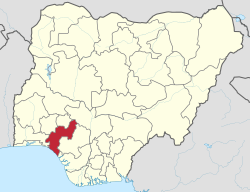INTRODUCTION
Ondo State is one of the six states that make up the South-West geopolitical zone of Nigeria. It has interstate boundaries with Ekiti and Kogi States to the North, Edo State to the East, Delta State to the Southeast, Osun State to the Northwest and Ogun State to the Southwest. The Gulf of Guinea lies to its South and the state’s capital is Akure.
LANDMASS, LOCATION AND POPULATION
Ondo State covers an area of 15,539 square kilometres and lies at latitude 7°10' North and longitude 5°05' East. It has a population of 3,460,877 (2006 census), 4,671,695 (2016 forecast) and a population density of 225. The state accounts for 2.4% of Nigeria's total population
HISTORY AND PEOPLE
The early settlers of Ondo State were the Yoruba people. According to legend, they originally migrated from Epe, a small town, about seven miles from the state on the Oke-Igbo road. They stayed there for some time before moving to their present location. Ondo State was originally part of the Western Region in the three-region structure of 1954 and was known as Ondo Province.
In 1967, with the creation of twelve federal states by General Yakubu Gowon'’s military government, Ondo State became part of Western State. The military government of General Murtala Muhammed created nineteen states out of the existing twelve in 1976 and Western State was divided into Oyo, Ogun and Ondo States. In 1996, the military government of General Sani Abacha carved Ekiti State out of Ondo State.
The main ethnic groups in Ondo State are the Yoruba and Ijaw people. There are ten languages in the state, with Ijaw and Yoruba being the main ones. The people are mostly Christians, although a sizable number of Muslims are in Ikare and some other parts of the state. There are also a number of traditional religion practitioners.
MAIN TOWNS AND CITIES
Akure (capital), Ikare, Ile-Oluji, Oka-Akoko, Okitipupa, Ondo, Ore, and Owo
LOCAL GOVERNMENT AREAS
ADMINISTRATORS AND GOVERNORS
David Ikpeme (Governor – Military): March 1976 – July 1978
Sunday Tuoyo (Governor – Military): July 1978 – October 1979
Adekunle Ajasin (Governor – Civilian (Unity Party of Nigeria)): October 1979 – December 1983
Michael Otiko (Governor – Military): January 1984 – September 1985
Michael Akhigbe (Governor – Military): September 1985 – August 1986
Ekundayo Opaleye (Governor – Military): August 1986 – December 1987
Raji Rasaki (Governor – Military): December 1987 – July 1988
Bode George (Governor – Military): July 1988 – September 1990
Sunday Olukoya (Governor – Military): September 1990 – January 1992
Bamidele Olumilua (Governor – Civilian (Social Democratic Party)): January 1992 – November 1993
Mike Torey (Administrator – Military): December 1993 – September 1994
Ahmed Usman (Administrator – Military): September 1994 – August 1996
Anthony Onyearugbulem (Administrator – Military): August 1996 – August 1998
Moses Fasanya (Administrator – Military): August 1998 – May 1999
Adebayo Adefarati (Governor – Civilian (Alliance for Democracy)): May 1999 – May 2003
Olusegun Agagu (Governor – Civilian (People's Democratic Party)): May 2003 – February 2009
Olusegun Mimiko (Governor – Civilian (Labour Party/People’s Democratic Party)): February 2009 - February 2017
Rotimi Akeredolu (Governor – Civilian (All Progressives Congress): February 2017 - Present
ECONOMY AND EDUCATION
Ondo State is predominantly tropical rainforest with some areas of forest savannah to its north. There are forest and mangrove swamps in the south of the state. Agriculture is very important, with a significant percentage of the state's labour force engaged in farming. Cocoa is the dominant cash crop in Ondo. Other crops cultivated for domestic consumption include yam, cassava and oil palm. The minerals found in the state include iron ore, granite, quartz, coal, tin, marble and petroleum. A number of agro-allied industries are located there. The people are also known for their bronze works and iron carvings.
Tertiary institutions in Ondo State are Federal University of Technology, Akure; Adekunle Ajasin University, Akungba-Akoko; Ondo State University of Science and Technology, Ondo; Achievers University, Owo; Wesley University of Science and Technology, Ondo; Rufus Giwa Polytechnic, Owo; and Adeyemi College of Education,Ondo.
FAMOUS SITES AND CULTURE
Sites
Idanre Hill, Idanre
Idanre Hill in Idanre local government area is on a Precambrian igneous batholith about 500 million years old. It has many large cuts that form deep valleys within it. There are a number of cultural sites there, such as the Agbooogun footprint, thunder water (Omi Apaara), Owa’s Palace, burial grounds, the Old Court and shrines. It was addd to the UNESCO World Heritage Tentative List in 2007.
Akure Forest Reserve, Akure
The Akure Forest Reserve was set aside for preservation and controlled use in 1936. It covers a land area of 66 square kilometres in Akure local government area. It has a variety of animals, such as chimpanzees and other primate species, insects and birds. Trees found in the Reserve are primarily mansonia, cola gigantea and trema orientalis.
Igbo Olodumare, Ile Oluji
The Igbo Olodumare which means ‘the forest of God’ is a mystic rainforest in Ile Oluji, Oke Igbo local government area. One of the unique features of the forest is the Ògèrìwèsé stream which many people believed possesses the power to neutralize negative magical powers or prevent evil from entering the village. Others include the sculptured image of an ancient hunter, and a ‘bottomless hole’ which according to legends, harbours mysterious creatures.
Culture
The Ariginya Festival symbolises the customs of the people and dignity of womanhood. The festival is one of the most important cultural events in Ondo State and takes place in Ikare Akoko every May. The Ekimogun Festival is used to showcase the rich cultural heritage of Ondo kingdom. Other cultural events include the Egungun (masquerade), Igog, Olokun, Obitun Odun Aje and Orosun Festivals.
NOTABLE INDIGENES
Fola Akintunde Ighodalo (1923 – 2005)
Daniel Fagunwa (1903 – 1963)
DID YOU KNOW
Ondo State is the highest producer of cocoa in Nigeria.
ONDO STATE IN PICTURES

